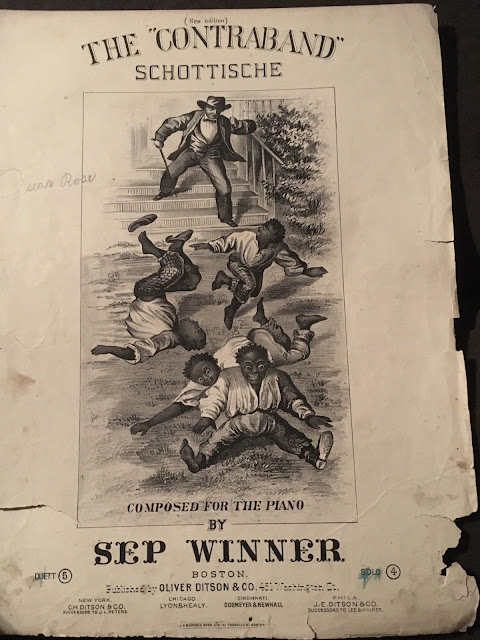I've been leafing through hundreds and thousands of old music sheets. Yes, it's e-bay again. I used to have a vast collection myself, but I downsized drastically, and it's now in the capable hands of Ms Andrea Cawelti at Harvard University. I just look at things, these days, that I used to buy.
Its many months since I had an ebay trawl. It's a bit of slog when the C18th and C19th stuff is all bundled in with the modern (ie C20th). But today I did. And I'm glad I did, in spite of all the duplicate postings and post-war stuff, because there were some pretty things to see.
Usually, old music, in shops or on e-bay, is British. But today ... fascinating ... the best bits were all American. It looked as if someone had happened upon two or three bound volumes of c1860s music, down Pennsylvania way, and broken them up to sell (more lucratively) as single songs. I was particularly delighted to see this: an original, Philadelphia copy of Sep Winner's 'Ten little injuns'.
We used to sing this song as children, in New Zealand, and, as one does, imagined it to be 'folk music'. But, of course, it wasn't. Somebody wrote it. By the time I was chanting my childish 'One little, two little, three little ..', those little Injuns had been around for eighty years.
The song was written, based on an older minstrel sketch, by Winner (1827-1902) in 1868, in Philadelphia, and introduced by the top minstrel of the city, Edward Freeman Dixey (1834-1904), of Carncross and Dixey's Star Troupe, resident at the city's 11th Street Opera House.
Winner was a music teacher, music seller, music publisher, songwriter, and also a friend and neighbour of Dixey. I see the 'Injuns' is dedicated to Master Frank Dixey Winner, a son?, so I imagine the friendship was a close one.
Anyway, Dixey, who had been originally the bones with Sanford's 'Opera Troupe', settled in Philadelphia's Spring Street, went into partnership with Carncross, and headed the minstrel activity in the city for some fifteen years, regularly introducing Winner's latest songs -- which included that other classic the yiddish 'O Where, O where, has my little dog gone' (dedicated to Dixey) and the immortal 'Listen to the mockingbird'.
I would think I am -- was -- not the only one to be ignorant of the existence and extent of the influence of Sep Winner. He has an important place in the history of American musical theatre ... I am glad I have now got to know him.





No comments:
Post a Comment